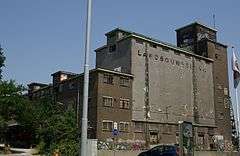Landbouwbelang (squat)
Landbouwbelang (LBB) is an industrial building in Maastricht, Netherlands. It offers working space for artists and social entrepreneurs and functions as a venue for cultural events. It has been squatted since April 2002.
| Landbouwbelang | |
|---|---|
 A street view on Landbouwbelang in 2010. | |
%26groups%3D_6e57eabbb5edee87ae813a47d95766c6b55bae5e.svg)
| |
| General information | |
| Architectural style | industrial |
| Address | Biesenwal 3 |
| Town or city | Maastricht |
| Country | Netherlands |
| Coordinates | 50°51′19″N 5°41′40″E |
| Current tenants | Cultural Freezone Landbouwbelang |
| Completed | 1939 |
| Owner | City of Maastricht |
| Website | |
| landbouwbelang | |
Landbouwbelang is located in the Boschstraatkwartier neighbourhood, on the bank of river Maas and next to the production site of a paper manufacturer Sappi.
History
It was constructed in 1939 for processing and storaging cereals by Vereniging Landbouwbelang Roermond.[1] The cereal processing activities ceased in the 1970s and the building was acquired by the neighbouring paper mill until being purchased by the City of Maastricht.[2]
The space served as a venue for events before becoming squatted on 6 April 2002.[2][3] Landbouwbelang reported 10 000 annual visitors in 2015.[4] Several artists, designers and social entrepreneurs have their working spaces at Landbouwbelang.[5]
Even despite of the Dutch squatting ban in 2009, getting the squatters removed requires an eviction court order. In order to have that granted, the owner of the building needs to present a development plan for the squatted building.[6] According to the communication of the City of Maastricht there are currently none.[7]
Read more
- "Landbouwbelang – The Cultural Underground of Maastricht". Landbouwbelang. Retrieved 10 December 2016.
- Janssen, Bert (29 September 2013). Cultural Freezone Landbouwbelang (in Dutch). Maastricht: Organic Press. ISBN 978-90-75924-12-1.
- Cleo Freriks (13 January 2016). "We are a rainbow-like community". observantonline.nl. Retrieved 13 January 2017.
References
- Vereniging Landbouwbelang Roermond 1914–1939. Vereniging Landbouwbelang Roermond. 28 September 1939. pp. 19–21.
- Zuidgeest, Arjen. "Landbouwbelang history". landbouwbelang.org. Retrieved 12 February 2017.
- Roland Ockhuysen (12 January 1996). "Regisseurs vieren vakantie in kennisland aan de Maas – Archief – Voor nieuws, achtergronden en columns". De Volkskrant (in Dutch). Retrieved 12 February 2017.
- Zuidgeest, Arjen. "LBB annual review 2015". landbouwbelang.org. Retrieved 12 February 2017.
- Janssen, Bert (29 September 2013). Cultural Freezone Landbouwbelang (in Dutch). Maastricht: Organic Press. ISBN 978-90-75924-12-1. Archived from the original on 25 February 2019.
- Kim Aupers (29 March 2016). "Krakers ontruimen". Van Till advocaten. Retrieved 10 December 2016.
- "Landbouwbelang". Belvédère Maastricht. Retrieved 10 December 2016.
External links
![]()